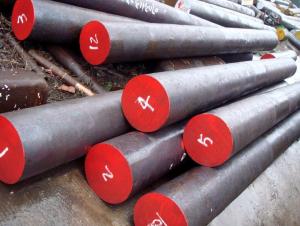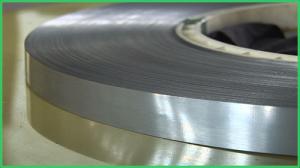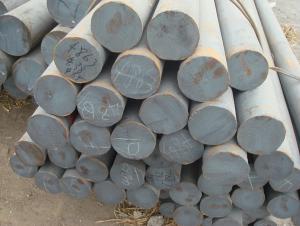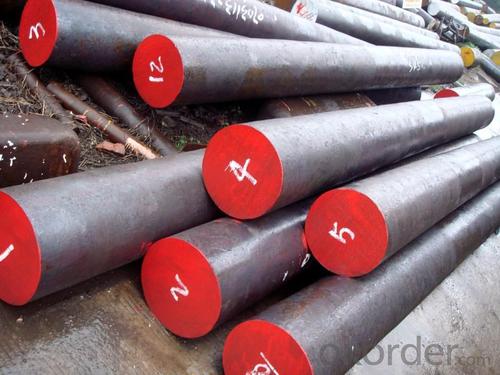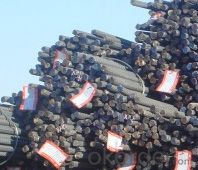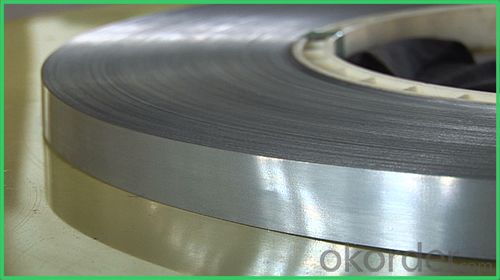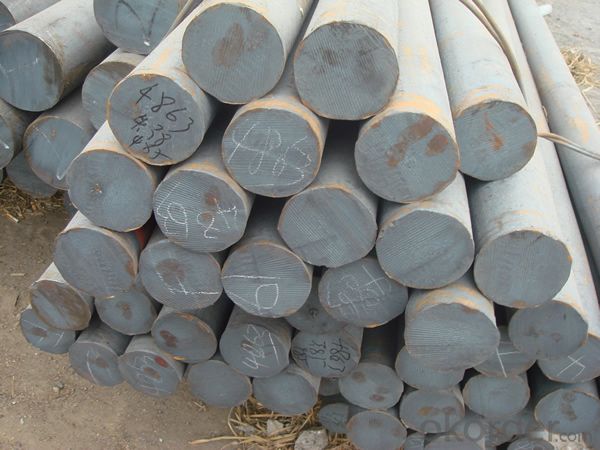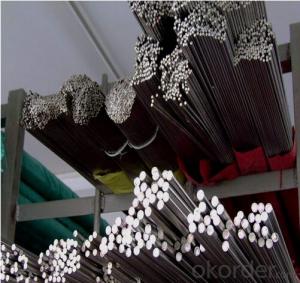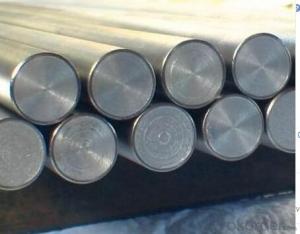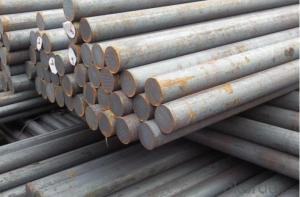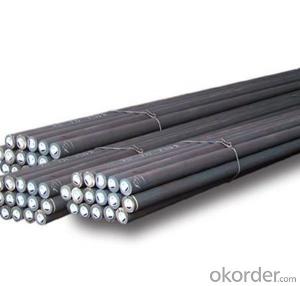GCr15 Bearing Steel Special Steel
- Loading Port:
- China Main Port
- Payment Terms:
- TT or LC
- Min Order Qty:
- -
- Supply Capability:
- -
OKorder Service Pledge
OKorder Financial Service
You Might Also Like
Product Description:
OKorder is offering Bearing Steelsat great prices with worldwide shipping. Our supplier is a world-class manufacturer of steel, with our products utilized the world over. OKorder annually supplies products to European, North American and Asian markets. We provide quotations within 24 hours of receiving an inquiry and guarantee competitive prices.
Product Applications:
Our products have been used in all kinds of areas, such as aviation, aerospace, navigation, nuclear, energy, chemical industry, electronic information, petrochemical, automotive, instrument and meter, Communication ,transportation, and medical instruments, etc. Bearing ring,steel rolling mill ,machinery, 100Cr6 bearing steel ball is widely used in high-speed and low-noise bearing, bicycle, motorcycle, automobile, bags, electronics.
.
Product Advantages:
OKorder's Bearing Steels are durable, strong, and resist corrosion.
Main Product Features:
· Premium quality
· Prompt delivery & seaworthy packing (30 days after receiving deposit)
· Corrosion resistance
· Can be recycled and reused
· Mill test certification
· Professional Service
· Competitive pricing
Product Specifications:
Manufacture: Hot rolled
Grade: Q195 – 235
Certificates: ISO, SGS, BV, CIQ
Length: 6m – 12m, as per customer request
Packaging: Export packing, nude packing, bundled
Packaging & Delivery of Bearing Steel GCr15
Mark: Heat No. will be cold stamped and Steel grade, diameter (mm), length (mm), and the manufacturer LOGO and weight (kg) is painted.
Standard seaworthy packing or as customer required
Delivery time: Within 30 days after order is confirmed.
FAQ:
Q1: Why buy Materials & Equipment from OKorder.com?
A1: All products offered byOKorder.com are carefully selected from China's most reliable manufacturing enterprises. Through its ISO certifications, OKorder.com adheres to the highest standards and a commitment to supply chain safety and customer satisfaction.
Q2: How do we guarantee the quality of our products?
A2: We have established an advanced quality management system which conducts strict quality tests at every step, from raw materials to the final product. At the same time, we provide extensive follow-up service assurances as required.
Q3: How soon can we receive the product after purchase?
A3: Within three days of placing an order, we will begin production. The specific shipping date is dependent upon international and government factors, but is typically 7 to 10 workdays.
Images:
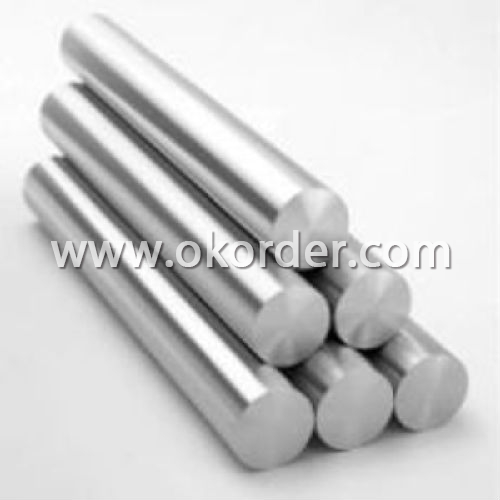
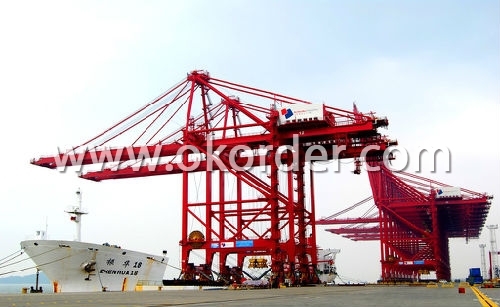
- Q: How does special steel perform in stamping applications?
- The unique properties of special steel make it an excellent choice for stamping applications. Its high strength and durability ensure that it can withstand wear and tear during the stamping process, resulting in longer tool life and reduced maintenance costs. Additionally, special steel's heat resistance allows it to maintain its structural integrity even at high temperatures, preventing warping or deformation. Its exceptional dimensional stability ensures precise and consistent results, while its excellent formability allows for the creation of intricate designs. Overall, special steel's properties make it a reliable and versatile option for a wide range of stamping applications.
- Q: How is heat-resistant steel used in high-temperature applications?
- Heat-resistant steel is specifically designed to withstand high temperatures without losing its strength or undergoing structural changes. It is commonly used in high-temperature applications such as power plants, furnaces, and aerospace industry. Due to its ability to maintain its mechanical properties at elevated temperatures, heat-resistant steel is used to fabricate critical components like turbine blades, exhaust systems, and heat exchangers, ensuring reliable and efficient operations even in extreme heat conditions.
- Q: What are the different special steel products available in the market?
- There are a wide variety of special steel products available in the market, each designed to meet specific industrial needs. Some of the common special steel products include: 1. Stainless Steel: This is a corrosion-resistant steel alloy that contains a minimum of 10.5% chromium. It is widely used in applications that require high resistance to corrosion, such as kitchen utensils, medical instruments, and chemical processing equipment. 2. Tool Steel: Tool steel is a type of carbon and alloy steel that is specifically designed to be used in the manufacturing of tools. It is known for its high hardness, resistance to abrasion, and ability to retain sharp edges. Tool steel is commonly used in the production of cutting tools, dies, and molds. 3. Alloy Steel: Alloy steel is a steel that has been alloyed with other elements, such as manganese, silicon, nickel, or chromium, to enhance its mechanical properties. It offers improved strength, toughness, and wear resistance compared to carbon steel. Alloy steel is used in various applications, including automotive components, construction equipment, and machinery parts. 4. High-Speed Steel: High-speed steel is a type of tool steel that is capable of cutting at high speeds without losing its hardness or ability to retain sharp edges. It is commonly used in the production of drills, milling cutters, and saw blades. 5. Spring Steel: Spring steel is a low-alloy, medium or high carbon steel that is known for its ability to retain its shape and elasticity even under high stress or repeated loadings. It is widely used in the manufacturing of springs, suspension systems, and shock absorbers. 6. Electrical Steel: Electrical steel, also known as silicon steel, is a specialized steel alloy that exhibits low electrical losses and high magnetic permeability. It is used in the production of electrical transformers, motors, and generators. 7. Heat-Resistant Steel: Heat-resistant steel is designed to withstand high temperatures without losing its mechanical properties. It is commonly used in applications such as furnaces, heat exchangers, and gas turbines. These are just a few examples of special steel products available in the market. The choice of steel product depends on the specific requirements of the application, including factors such as corrosion resistance, strength, hardness, and heat resistance.
- Q: What are the applications of special steel in the automotive supply chain?
- Special steel has various applications in the automotive supply chain. It is commonly used in the production of critical components such as engine parts, axles, gears, and suspension systems. Special steel provides high strength, durability, and corrosion resistance, contributing to improved performance and safety in vehicles. Additionally, it enables weight reduction, enhancing fuel efficiency and reducing emissions. Overall, special steel plays a crucial role in enhancing the reliability, efficiency, and sustainability of the automotive industry.
- Q: How does copper influence the characteristics of special steel?
- Copper has a significant influence on the characteristics of special steel due to its unique properties and its role as an alloying element. When added to steel in small amounts, copper can enhance its strength, hardness, and resistance to corrosion. One of the key benefits of copper in special steel is its ability to improve the steel's mechanical properties. Copper increases the strength and hardness of steel, making it more suitable for applications that require high tensile strength and durability. This is particularly important in industries such as construction, automotive, and aerospace, where strong and durable steel is essential. Furthermore, copper also enhances the steel's resistance to corrosion. It forms a protective oxide layer on the surface of the steel, preventing the formation of rust and other forms of corrosion. This makes copper-infused steel ideal for use in harsh environments or applications where exposure to moisture or corrosive substances is common. Additionally, copper can improve the machinability of special steel. It acts as a lubricant during the machining process, reducing friction and heat generation. This results in improved tool life, reduced energy consumption, and enhanced productivity. In summary, the addition of copper to special steel can significantly influence its characteristics. It enhances the steel's strength, hardness, and corrosion resistance, making it more suitable for demanding applications. Moreover, copper also improves the machinability of steel, leading to increased productivity and cost-effectiveness.
- Q: What are the emerging trends in special steel production?
- The special steel production industry is being shaped by several emerging trends: 1) The industry is experiencing an increasing demand for high-performance alloys. Technological advancements and industrial applications require special steels with superior properties, such as high strength, corrosion resistance, and heat resistance. This has led to a higher demand for alloys like stainless steel, tool steel, and superalloys. 2) Advanced manufacturing techniques, such as additive manufacturing (3D printing) and precision machining, are being adopted for special steel production. These techniques allow for the production of complex geometries and customized components, resulting in improved efficiency and reduced material waste. 3) Sustainability is a key focus in the steel industry. Special steel producers are adopting sustainable practices, such as using recycled materials, energy-efficient production processes, and waste management strategies. Investments in cleaner technologies are being made to meet the growing demand for sustainable steel products. 4) The integration of digital technologies, automation, and data analytics, known as Industry 4.0, is revolutionizing special steel production. Real-time monitoring, predictive maintenance, and optimization of production parameters are made possible through Industry 4.0 solutions. This leads to increased productivity, quality, and cost-effectiveness. 5) Special steel producers are developing new alloys to meet the specific requirements of emerging industries like aerospace, renewable energy, and electric vehicles. For example, lightweight, high-strength steels are being developed for aerospace applications, and corrosion-resistant steels for offshore wind turbines. 6) Collaborations and partnerships between special steel producers, research institutions, universities, and other industry players are on the rise. These collaborations drive innovation, knowledge sharing, and the development of new steel grades, applications, and production processes. In conclusion, the future of special steel production is being shaped by the demand for high-performance alloys, adoption of advanced manufacturing techniques, focus on sustainability, integration of Industry 4.0 technologies, development of alloys for emerging industries, and collaborations. These trends create opportunities for growth and innovation in the industry.
- Q: What are the properties of magnetic alloy steel?
- Magnetic alloy steel possesses magnetic properties due to its composition of iron and other elements such as nickel, cobalt, and chromium. These alloys are known for their high magnetism, excellent strength, and resistance to corrosion. They have a wide range of applications in industries like electrical engineering, automotive, and aerospace, where their magnetic properties are crucial for tasks like generating and directing magnetic fields, magnetic shielding, and producing high-performance magnets.
- Q: How is special steel used in toolmaking?
- Special steel is used in toolmaking because of its exceptional properties such as high hardness, toughness, and wear resistance. It is utilized to manufacture various types of tools including drills, cutting tools, dies, and molds. The superior properties of special steel enable these tools to withstand high temperatures, resist deformation, and maintain sharpness for extended periods. Additionally, special steel can be heat treated to achieve specific characteristics, making it an ideal choice for toolmaking applications.
- Q: What are the different testing methods for special steel?
- To ensure the quality and performance of special steel, there are various testing methods commonly used. These methods encompass: 1. Chemical Analysis: Determining the steel's chemical composition, including elements and impurities, is crucial. It confirms adherence to specific chemical composition requirements. 2. Mechanical Testing: Evaluating mechanical properties like strength, ductility, hardness, and toughness is achieved through tests such as tensile, impact, hardness, and fatigue testing. 3. Microstructure Analysis: Assessing the steel's internal structure, grain size, and shape requires microscopic examination. Techniques like optical and electron microscopy, as well as X-ray diffraction, help identify any defects or abnormalities. 4. Non-Destructive Testing (NDT): Inspecting the steel without causing damage is possible through NDT methods. These include ultrasonic, magnetic particle, liquid penetrant, and radiographic testing to detect surface and subsurface defects. 5. Corrosion Testing: In applications where corrosion resistance is vital, various methods like salt spray, electrochemical, and immersion testing are employed. They evaluate the steel's resistance and corrosion rate. 6. Metallography: Preparing a cross-section of the steel sample, polishing it, and etching it reveals its microstructure. This aids in assessing quality, heat treatment effects, and grain size distribution. 7. Dimensional and Surface Inspection: Ensuring the steel meets required dimensional tolerances and surface quality is crucial. Techniques like dimensional measurement, surface roughness measurement, and visual inspection verify conformity. By implementing these testing methods, manufacturers and quality control personnel ensure that special steel meets the necessary standards, specifications, and customer requirements.
- Q: What are the main factors that determine the cost of special steel?
- The cost of special steel is primarily determined by several key factors. Firstly, the composition of the steel plays a significant role in determining its cost. Special steels often have specific alloying elements added to enhance their properties, such as corrosion resistance, strength, or heat resistance. The cost of these alloying elements can vary widely, and the greater the quantity and complexity of the alloy, the higher the cost of the steel. Secondly, the manufacturing process used to produce the special steel can greatly impact its cost. Special steels often require more intricate and controlled manufacturing processes compared to regular steel. These processes may involve additional steps such as precise heat treatment, forging, or casting, which can increase the overall cost of the steel. Another crucial factor influencing the cost of special steel is market demand and availability. If a particular type of special steel is in high demand but limited supply, the cost tends to rise. Conversely, if there is a surplus of a specific type of special steel, the cost may decrease. Market forces, including global supply and demand dynamics, can significantly impact the cost of special steel. Moreover, the quality and certification of the special steel can also affect its cost. Higher-quality steel that meets stringent industry standards and certifications may often command a higher price due to the additional testing, quality control, and documentation required. Transportation and logistics costs are also important factors to consider. If the steel needs to be transported over long distances or requires specialized handling, it can add to the overall cost. Lastly, economic factors such as currency exchange rates, inflation, and government policies can impact the cost of special steel. Fluctuations in exchange rates can affect the cost of raw materials and manufacturing equipment, which in turn influence the final price of the steel. Government policies, such as import and export tariffs or subsidies, can also impact the cost of special steel. In summary, the main factors that determine the cost of special steel are the composition, manufacturing process, market demand and availability, quality and certification, transportation and logistics, and economic factors. Understanding these factors is crucial for both buyers and sellers of special steel to make informed decisions and ensure competitive pricing.
Send your message to us
GCr15 Bearing Steel Special Steel
- Loading Port:
- China Main Port
- Payment Terms:
- TT or LC
- Min Order Qty:
- -
- Supply Capability:
- -
OKorder Service Pledge
OKorder Financial Service
Similar products
Hot products
Hot Searches
Related keywords
